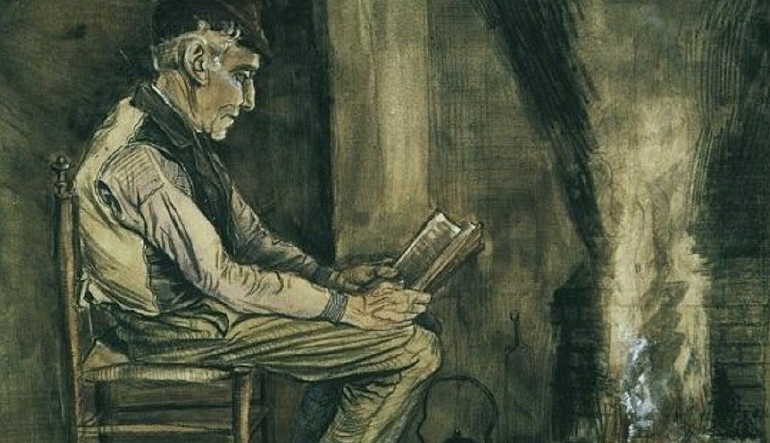Difficult Novels

What makes a novel “difficult,” and why does that label matter? When we think of traditionally “difficult” writers—James Joyce or Thomas Pynchon, for example—the answer to the first part of that question may seem obvious. Their “difficult” fiction is long, experimental in both language and form, and contains an encyclopedia of cultural references that may not be easily accessible to the “general reader”—or, in their entirety, to any reader. Yet, I am skeptical of the idea of “difficult” literature, and indeed of the idea of a “general reader.” As the reception of Anna Burns’ Man-Booker prize-winning novel, Milkman, serves to demonstrate, these are relative and imprecise terms that often harbor deeper motivations relating to class and other modes of privilege.
In Samuel Johnson’s Lives of the Poets series, published in three volumes between 1779 and 1781, he writes the following of Thomas Gray’s “Elegy Written in a Country Churchyard”:
In the character of his Elegy I rejoice to concur with the common reader, for by the common sense of readers uncorrupted with literary prejudices, after all the refinements of subtlety and the dogmatism of learning, must be finally decided all claim to poetical honours. The ‘Churchyard’ abounds with images which find a mirror in every mind, and with sentiments to which every bosom returns an echo.
Johnson’s appeal to the “common reader” is anti-intellectual in its embrace of “readers uncorrupted with literary prejudices.” The “educated” reader—which must include Johnson himself—is excluded from this conception, even as it reaches towards universality: “images which find a mirror in every mind, and with sentiments to which every bosom returns an echo.” The contradiction inherent in this characterization is obvious. From its earliest incarnations, then, ideas of the “common” reader have been both idealized and inconsistent. This persists in the slippery persona of the “general” reader familiar within modern publishing and the attendant concerns with “readability.”
The history and continued legacy of “readability” in literary culture is grounded in this fundamental bifurcation of the reading public into a literary elite, which, however chastised by Johnson’s remarks, retains its aura of superiority, and the general masses, for whom—if we are to follow Johnson—relatability and emotional connection triumph over matters of style, and, arguably, substance. Within this framework, “readability” is the exclusive domain of the “common reader.” There is something incredibly patronizing about this, and about the way it continues to inform aspects of literary criticism.
When critics speak of “difficult” books, they often do so with the general reader in mind. Difficulty is, after all, a concept relative to expertise. It is also a concept with both positive and negative connotations. A reader of Joyce may delight in the perceived difficulty of the material. The word takes on a much less glamorous aspect, however, when that same difficulty is viewed as in some way “unnecessary,” or, more insidiously, “undeserved.” This meaning is usually reserved for contemporary fiction, and especially for works written from a place of disadvantage—by a woman, a minority, or an individual from a working-class background. We can see this at work in the reception of Milkman.
Burns wrote Milkman during a period of personal and financial hardship. Suffering with back pain, she relied on state support, and even on food banks, services which she thanked in the acknowledgements of her novel. Speaking in an interview after winning the Man-Booker Prize, Burns remarked, candidly, “It’s nice to feel I’m solvent. That’s a huge gift.”
Set in 1970s Belfast, Burns’ novel captures the restrictions and injustices of life during the Troubles in Northern Ireland through the eyes of a young woman. At just eighteen-years old, the narrator and protagonist, “middle sister,” attracts the unwelcome attention of a character known only as “the milkman.” A much older man, we are told: “He wasn’t our milkman. I don’t think he was anybody’s. He didn’t take milk orders. There was no milk about him.” In fact, the milkman is a significant presence in the local paramilitary and has been linked to several high-profile killings. The milkman’s interest in the narrator is sparked by her love of reading, which marks her out from the rest of the community. This interest is the catalyst for a circle of danger, gossip, and suspicion drawing ever tighter around her.
Milkman is compelling and darkly comic even as violence and threats of violence remain palpable at every moment. The voice of the narrator is sarcastic, witty, chatty, and meandering. It is the voice of a young working-class woman living through a time of drastically curtailed freedoms, and a voice that many critics struggled to understand.
Writing for The Guardian, Sam Leith collected together a variety of responses to Burns’ novel. It was classed as ‘“Odd,” “impenetrable,” “hard work,” “challenging,” and “brain-kneading.” As Leith perceptively notes, these terms “have not been meant, I think, as compliments.” I am not the first person to note the gendered and classed dimension to these epithets. Earlier this month, A. N. Devers, writing for the L.A. Times, asked, “Would [Milkman] receive this criticism of being too hard if it were written by a man?” And Rhiannon Lucy Cosslett has observed in The Guardian that, “As is so often the case in Britain, whether you get Milkman or not could be a class thing.” In the difficulties it apparently posed to traditional critics, Burns’ novel seems to transgress some unwritten boundaries for a female writer on state benefits—particularly one writing about female working-class experience. It also appears to invert Johnson’s framework of “educated” versus “common” readers. This is apparent when you look at the responses of “general readers” (i.e. not professional critics) themselves.
One Twitter user writes, “’Milkman’ being described as ‘difficult’ & ‘stylised’ really bothers me. It is written in the voice of countless Norn Irish women – the language feels familiar & warm to me.” Another affectionately replicates the language and style of Burns’ novel in a way that performs the familiarity it professes: “Any other NI readers finding Milkman only as difficult and definitely as strangely comforting as a conversation with your own mother about the ginger guy three years above you at school’s sister getting married to the wee fella who used to live beside us in our old house?” These readers are switched on to the problematics of the label “difficult.” One comment in particular speaks to the heart of the matter: “I was initially mildly offended when I saw people saying it was a difficult read because it’s how I (and everyone I know) actually speak. Then I realized that many people aren’t used to it because our voices are not valued in society. THEN I was annoyed for real.” As these astute readers point out, the epithet “difficult” in this context doesn’t only distance potential readers from the text, it also betrays a noteworthy lack of familiarity. There is a sense that the “educated” reader needs to go back to school.
If difficulty is, as I have suggested, relative, then the “difficulty” of Milkman is relative in a way that has a significant classed and gendered dimension. The Twitter users quoted here are Northern Irish women for whom the prose of Milkman is as familiar as their own mothers. Finding “difficulty” in this book, therefore, would seem to signal a detachment from, on the one hand, the Northern Irish context, but, more generally, the context of many regional working-class communities in the UK. As Rhiannon Lucy Cosslett—a writer from a Welsh background—has said, “Milkman has been branded a difficult book. It isn’t. It’s written how many people speak.” The supposed difficulty of Burns’ novel speaks to the relative paucity of working-class critics and journalists working in the industry today, as well as to that brand of literary elitism for which genuine, deserving “difficulty” is the reserve of those with a very particular pedigree.



